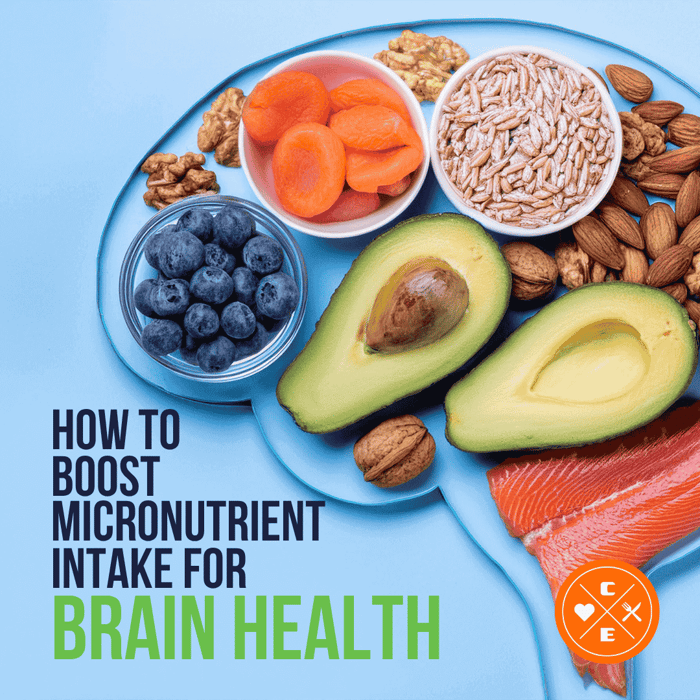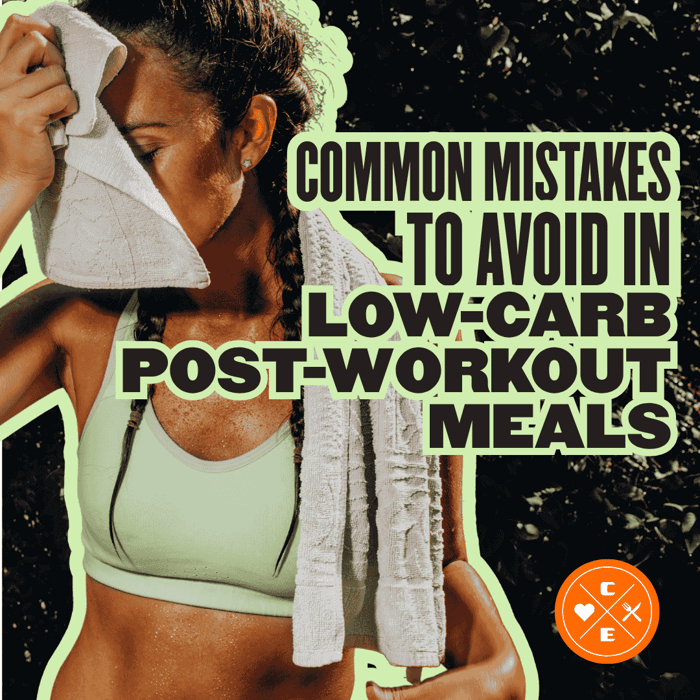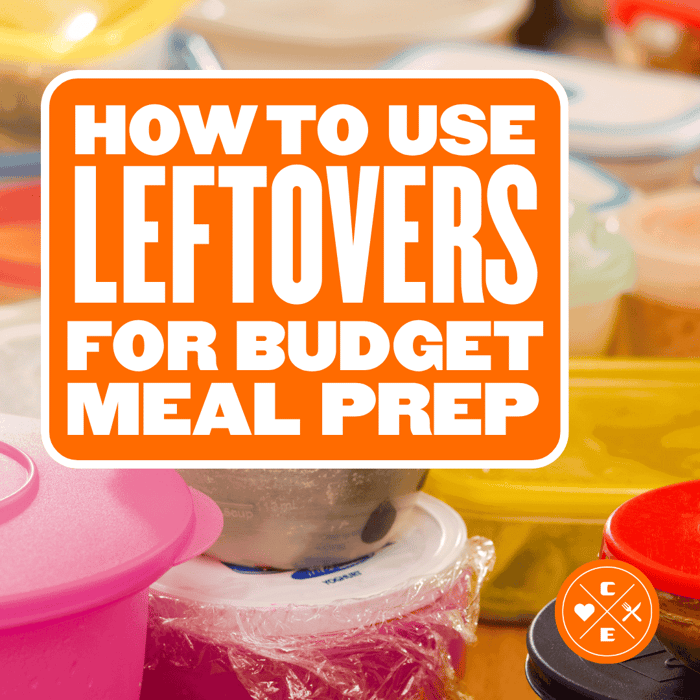How to Boost Micronutrient Intake for Brain Health

Jason Nista
Nutrition
06/26/2025 8:50am
16 minute read
Table of Contents
Your brain needs more than just calories - it thrives on micronutrients like vitamins and minerals to stay sharp, focused, and healthy. Deficiencies in key nutrients like vitamin D, B12, and iron can lead to memory issues, trouble concentrating, and even depression. Here’s how to give your brain the support it needs:
- Omega-3 Fatty Acids: Found in fatty fish (salmon, mackerel, sardines) and plant-based sources (chia seeds, flaxseeds, walnuts), these fats improve memory and reduce inflammation.
- B Vitamins (B6, B9, B12): Essential for energy, mood regulation, and nerve protection. Get them from leafy greens, eggs, fish, and legumes.
- Vitamin D: Supports nerve growth and reduces inflammation. Sources include salmon, fortified milk, and egg yolks.
- Antioxidants (Vitamins C & E): Protect brain cells from damage. Eat berries, nuts, and colorful vegetables.
Quick Tips:
- Eat nutrient-rich foods like fatty fish, leafy greens, berries, and nuts daily.
- Plan meals using brain-friendly diets like the MIND or Mediterranean diet.
- Consider supplements if deficiencies are confirmed, but consult a doctor first.
- Use meal delivery services like Clean Eatz Kitchen for convenient, balanced options.
Protecting Your Brain Health with the Right Nutrients
Key Micronutrients That Support Brain Function
Micronutrients play a vital role in keeping your brain sharp and functioning effectively. They protect brain cells, support memory, and enhance learning abilities. Understanding which nutrients power your brain can help you make smarter choices about your diet and supplements. Let’s explore some key players in brain health.
Omega-3 Fatty Acids
Omega-3 fatty acids are essential for maintaining a healthy brain. Two types, DHA (docosahexaenoic acid) and EPA (eicosapentaenoic acid), are especially important. These fats form the building blocks of brain cell membranes and ensure smooth communication between neurons.
DHA makes up about 40% of the brain's fatty acids, while EPA, though present in smaller amounts, plays a big role in reducing inflammation. Considering that nearly 60% of the brain is made of fat, with DHA accounting for 25% of this, omega-3s are a structural cornerstone for your brain.
Research backs their benefits. In one study, older adults with cognitive decline who took 900 mg of DHA daily for 24 weeks showed improvements in memory and learning skills. Another study highlighted how EPA-rich supplements boosted cognitive performance.
To get more omega-3s, eat fatty fish like salmon, mackerel, and sardines twice a week. Plant-based sources such as flaxseeds, chia seeds, and walnuts are also options, though your body needs to convert these into active forms.
B Vitamins (B6, B9, and B12)
B vitamins are crucial for energy production in brain cells and for regulating mood. They also aid in producing neurotransmitters like serotonin and dopamine, which are key for emotional balance and cognitive health. Since these vitamins are water-soluble and not stored in the body, a daily intake is essential - especially since up to 15% of adults over 60 experience vitamin B12 deficiency.
- Vitamin B6 helps create neurotransmitters that influence mood and sleep.
- Folate (B9) supports the development of new brain cells and maintains cognitive function.
- Vitamin B12 is essential for protecting nerve coatings and aiding memory.
You can find B vitamins in foods like leafy greens, eggs, fish, poultry, legumes, and fortified cereals. A varied diet ensures your brain gets the full range of these essential nutrients.
Vitamin D and Antioxidants
Vitamin D is another key nutrient, supporting nerve growth, neurotransmission, and calcium balance. It also helps reduce inflammation, potentially lowering the risk of dementia and stroke. Severe vitamin D deficiency has been linked to declines in visual memory.
"Vitamin D can create resilience to protect the aging brain against diseases such as Alzheimer's disease and other related dementias." – Sarah Booth, Director of the Jean Mayer USDA Human Nutrition Research Center on Aging at Tufts University
Antioxidants like vitamins C and E act as the brain’s defense team, fighting free radicals that can harm brain cells. For instance, women who ate two or more servings of strawberries and blueberries each week saw memory decline delayed by up to two-and-a-half years.
| Vitamin D Food Sources | Approximate Content |
|---|---|
| Salmon (100g serving) | 300–400 IU |
| Fortified Milk (1 cup) | 120 IU |
| Egg Yolk (1 large) | 35 IU |
| Fortified Yogurt (8 oz) | 116 IU |
| Cod Liver Oil (1 tsp) | More than daily needs |
For antioxidants, aim for at least 300 g of fresh fruits and vegetables daily. Berries, nuts, leafy greens, and colorful vegetables are excellent sources of brain-protective compounds.
How to Get More Micronutrients Through Food
Getting the nutrients your brain needs from whole foods is one of the best ways to support cognitive health. The right foods provide a mix of vitamins, minerals, and antioxidants that work together to protect and nourish your brain.
Add Nutrient-Rich Foods to Your Diet
Incorporating nutrient-packed foods into your meals can make a big difference for brain health. Fatty fish like salmon, mackerel, tuna, herring, and sardines are excellent sources of EPA and DHA, two omega-3 fatty acids that play a key role in brain function.
Leafy greens such as kale, spinach, collards, and broccoli are full of nutrients like vitamin K, lutein, folate, and beta carotene, which may help delay cognitive decline by several years. These vegetables are a simple yet powerful addition to your diet.
Berries - think strawberries, blueberries, blackberries, and mulberries - are loaded with flavonoid antioxidants, which protect brain cells from damage.
Nuts and seeds, including walnuts, almonds, sunflower seeds, and chia seeds, offer omega-3s and vitamin E, both of which support better blood flow and cognitive performance. Plant-based options like flaxseeds and soybeans provide ALA omega-3s, though these are less efficiently converted by the body compared to fish-based sources. Whole grains like brown rice, oatmeal, and whole-grain bread also contribute vitamin E, further supporting brain health.
Even dark chocolate, as long as it has at least 70% cocoa content, can be beneficial. It may improve brain plasticity, which is crucial for learning and memory.
To get the most out of these foods, try integrating them into your daily meals for a consistent and balanced approach to nutrition.
Plan Your Meals for Better Nutrition
Meal planning can help you consistently include brain-supportive foods in your diet. Start by evaluating your current eating habits and setting goals to incorporate more nutrient-dense options into every meal. When grocery shopping, focus on whole foods and cut back on processed items. Opt for cooking methods like grilling, roasting, or stir-frying to preserve the nutrients in your meals.
Vary your food choices weekly to ensure you’re getting a wide range of nutrients. The MIND diet, which combines elements of the Mediterranean and DASH diets, is a helpful guide. It emphasizes plant-based, antioxidant-rich foods while limiting saturated fats and added sugars, both of which can negatively impact brain health.
If you’re unsure where to start, consider consulting a registered dietitian to create a meal plan tailored to your needs. Don’t forget to stay hydrated - drinking plenty of water supports nutrient transport to your brain cells and helps maintain cognitive function.
Use Clean Eatz Kitchen Meal Options
![]()
For those days when meal prepping feels impossible, Clean Eatz Kitchen offers a practical solution. Their chef-prepared meals are designed with balanced nutrition in mind, making it easier to get the micronutrients your brain needs without spending hours in the kitchen.
These meals are portion-controlled, frozen for freshness, and fully cooked - just heat them in the microwave and enjoy. With no subscription required, you can order meals as needed, giving you flexibility.
If you have dietary restrictions, Clean Eatz Kitchen also offers gluten-free options. Beyond full meals, they provide snacks and supplements to help you maintain your nutrient intake throughout the day. This convenient option ensures you can stick to a brain-healthy diet even on your busiest days.
sbb-itb-1989a25
When and How to Use Supplements
While whole foods should always be your primary source of nutrition, supplements can step in to fill the gaps when your diet falls short. Think of them as a way to build upon the dietary adjustments and meal planning strategies we've already discussed - not as a replacement for healthy eating.
When You Might Need Supplements
There are certain situations where supplements may become necessary to support brain health. One major factor is age. According to Dr. JoAnn Manson, MD, MPH, DrPH:
"We know nutrition is of key importance for optimal brain health. We also know that at older ages, nutrient deficiencies are common. It's more likely with age to have a deficiency in one or more micronutrients - essential vitamins or minerals that are important to health."
Nutrient deficiencies are more common than you might think. For example, research shows that 68% of Mexican women don’t meet the recommended intake for folate (vitamin B9), and 55% of Turkish adults lack sufficient thiamine (vitamin B1) in their diets.
You might also consider supplements if you have dietary restrictions that limit your food options - such as veganism, gluten-free diets, or food allergies. Similarly, certain health conditions can interfere with your body’s ability to absorb nutrients or increase your overall nutritional needs. If a blood test confirms a specific deficiency, targeted supplementation can often help.
As we age, the risks for conditions that can impact cognitive function - like Alzheimer’s disease, diabetes, heart disease, depression, or even poor vision and hearing - also increase. These health issues can create a cycle where poor health affects both nutrient absorption and brain function.
If dietary limitations, age, or health conditions suggest a need for supplements, the next step is choosing the right ones.
How to Pick Quality Supplements
With the supplement market expanding rapidly, it’s more important than ever to focus on quality and safety when making your choice.
Start with third-party certifications. Look for seals from trusted organizations like the U.S. Pharmacopeia Verified Mark, NSF certification, FDA approval, GMP (Good Manufacturing Practices), or ConsumerLab verification. Dr. Manson advises selecting multivitamins that include at least 20 micronutrients and carry a seal confirming quality control and testing.
Opt for clinically tested formulations. Products with proven results in scientific studies are your safest bet. For instance, Centrum Silver Adults 50+ has shown measurable cognitive benefits in clinical trials, according to research from Mass General Brigham. Other well-studied ingredients for brain health include Neurofactor™, phosphatidylserine, and key B vitamins.
Check for bioavailability. This refers to how easily your body can absorb nutrients from the supplement. Choose products with active forms of vitamins and minerals rather than synthetic ones that may be harder for your body to process. Avoid supplements loaded with artificial colors, flavors, sweeteners, or excessive fillers.
Read labels carefully. Be wary of exaggerated claims, especially those that promise to reverse or cure specific conditions. Since the FDA doesn’t evaluate supplements for effectiveness, safety, or quality before they hit the shelves, it’s up to manufacturers to self-regulate. As Dr. Olivia I. Okereke, MD, MS cautions:
"Be cautious about anything that's making claims of effects on cognitive aging when they haven't been tested rigorously in the way we did with these randomized trials."
Consider interactions with other medications or supplements. About 22% of supplement users report experiencing adverse effects. That’s why it’s essential to consult with a healthcare provider before starting any new supplement regimen.
Finally, remember that supplements are meant to complement a healthy diet - not replace it. Dr. Manson underscores this point:
"Multivitamins and other dietary supplements will never be a substitute for a healthy diet and healthy lifestyle. This is a complementary approach."
To stay organized, keep a detailed record of the supplements you take, including dosages and timing. Share this information with your healthcare provider to help them monitor for potential interactions and assess whether your supplements are meeting your needs effectively.
Getting Nutrients Through Meal Delivery Services
Meal delivery services make it easier to enjoy balanced, nutritious meals without the hassle of planning or preparation. By offering expertly designed, ready-to-eat options, these services allow you to focus on other aspects of your busy life while still eating meals that support brain health and overall well-being. They also help ease the stress of meal planning, providing a convenient way to stick to specific nutritional goals.
Custom Meal Plans for Your Nutrition Goals
Clean Eatz Kitchen takes the guesswork out of maintaining proper nutrition by offering customizable meal plans tailored to your dietary needs. Their meal plans are designed not only to cater to specific diets but also to enhance brain health through carefully selected micronutrient profiles. Options include high-protein, weight loss, gluten-free, and keto plans, each offering a distinct nutritional focus.
For instance, the high-protein plan balances macronutrients to support cognitive function, while the weight loss plan provides portion-controlled meals under 600 calories. Whether you follow a vegetarian, vegan, or pescatarian diet, their diverse menu ensures you’ll find nutrient-packed options suited to your preferences.
Pre-Portioned Meals Ready to Eat
Portion control plays a critical role in nutrient absorption and maintaining steady nutrient levels that benefit brain function. Clean Eatz Kitchen’s pre-portioned meals help prevent overeating, a common issue - studies show that 70% of Americans overeat at least once a week due to oversized portions. This approach can reduce daily calorie intake by as much as 20% while promoting better nutrient absorption.
Each meal is flash-frozen to preserve essential nutrients like B vitamins and antioxidants. At $8.99 per meal, with free shipping on orders over $85, these pre-portioned options eliminate the need to measure serving sizes. They deliver a well-rounded mix of proteins, carbs, and fats to sustain energy and support brain health, all while simplifying your daily routine.
Conclusion: Making Micronutrients a Priority for Brain Health
Supporting your brain health starts with adopting habits that seamlessly align with your daily life. Studies consistently highlight the benefits of a balanced diet packed with antioxidants, healthy fats, and essential vitamins for improving memory and boosting cognitive function.
To keep your brain in top shape, aim for a mix of nutrient-dense whole foods, targeted supplements, and even convenient options like meal delivery services. Incorporate brain-friendly staples like leafy greens, fatty fish, berries, and nuts while maintaining variety in your diet . While the brain accounts for just 2% of your body weight, it burns through 25% of your glucose, making consistent nutrient intake essential.
"Optimal cognitive capacity is vital throughout all stages of life. Most notably a healthy nutrition in childhood and adolescence is crucial for brain development and cognitive performance." - Uwe Gröber, Academy of Micronutrient Medicine (AMM)
Consistency is key. Chronic deficiencies in micronutrients can heighten the risk of neurological diseases, while maintaining adequate levels helps enhance cognitive functions and may ward off neurodegenerative conditions. Practical strategies, like adjusting your diet and using meal delivery services, make it easier to meet your nutritional needs. For example, Clean Eatz Kitchen offers balanced, portion-controlled meals, simplifying the process of fueling your brain with the nutrients it requires for optimal performance.
Did you know that over 60% of the brain is made up of fat, with DHA accounting for 90% of its omega-3 fatty acids? To support this, prioritize whole foods for your daily nutrition and use supplements only when addressing known deficiencies or specific needs. Staying hydrated and cutting back on processed foods in favor of fresh, whole ingredients can also make a big difference.
FAQs
How can I tell if I’m not getting enough micronutrients for optimal brain health?
If you’re dealing with fatigue, trouble focusing, memory lapses, or mood swings, a micronutrient deficiency could be affecting your brain health. Some of the most common culprits include vitamin B12, iron, zinc, and vitamin D - nutrients that play a critical role in maintaining energy and cognitive function.
The best way to confirm whether you're deficient is through a blood test. These tests can measure your nutrient levels and are typically conducted by a healthcare provider. Alternatively, at-home test kits are available, which send your sample to a lab for analysis. If you think a deficiency might be the issue, it’s a good idea to talk to a medical professional to figure out the next steps.
How can I easily add more brain-boosting foods to my daily diet?
To give your brain a boost, try adding leafy greens like spinach and kale to your meals. These greens are rich in vitamin K and folate, both of which play a role in supporting cognitive health. Include fatty fish like salmon in your diet for a dose of omega-3 fatty acids, which are known to benefit brain function. For a snack, grab a handful of blueberries - their antioxidants can help protect your brain from oxidative stress. Don’t forget nuts and pumpkin seeds, which provide healthy fats and essential nutrients that contribute to overall brain health.
For a well-rounded approach, aim for meals that combine whole grains, colorful vegetables, fresh fruits, and healthy fats. If meal planning feels overwhelming, prepping ahead can save time and ensure you're sticking to your goals. You might also explore options like Clean Eatz Kitchen, which offers portion-controlled, chef-prepared meals tailored to support a healthy lifestyle.
When should I consider taking supplements for brain health, and how do I choose the right ones?
If your diet is falling short on essential nutrients like B vitamins (B6, B12, folic acid), vitamin D, or zinc, you might want to consider supplements to support brain health. These nutrients are key players in maintaining cognitive function and could help lower the chances of mental decline, especially as you get older.
When choosing a supplement, prioritize products that have been clinically tested and come with third-party certifications such as USP or NSF. These certifications can provide added assurance of quality and safety. Be sure to read the ingredient list closely to steer clear of unnecessary additives. And don’t skip consulting a healthcare provider before starting any new supplement - this is especially important if you’re on medications or managing existing health conditions.
Related Articles
Common Mistakes in Low-Carb Post-Workout Meals
20 minute read
Carb Loading for Multi-Day Stage Races
15 minute read
How To Use Leftovers For Budget Meal Prep
18 minute read



